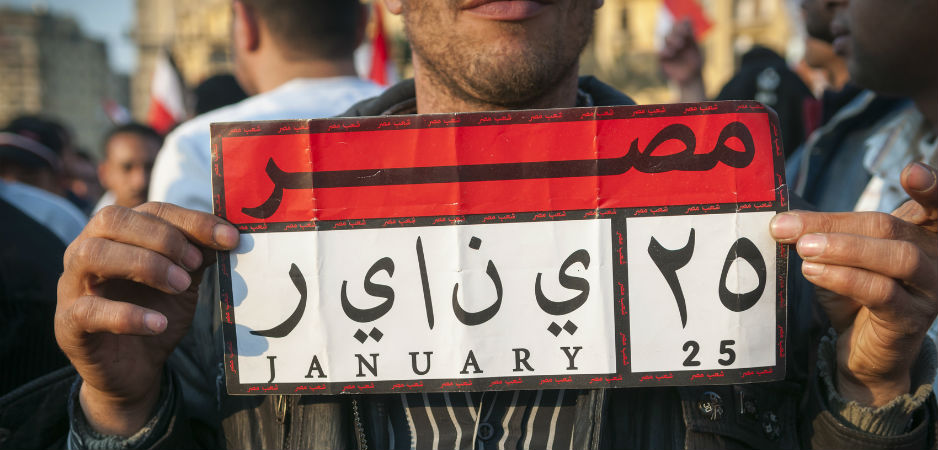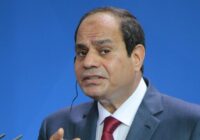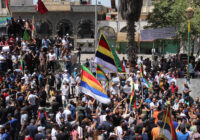In Egypt, economic hardship and repression are reaching a point where the people are no longer willing the stay silent.
Faced with a drop in popularity, intermittent protests against rising prices and calls for a mass anti-government demonstration, Egyptian President Abdel Fattah al-Sisi is seeking to appease the country’s youth, soccer fans and activists with promises of change.
Sisi’s efforts have included a one-time lifting of a ban on spectators attending soccer matches; promises to revise Egypt’s draconic anti-protest law; reviewing cases of youth detained without trial; and holding monthly meetings with young people to follow up on resolutions of a national youth conference held in early October. However, these moves provoked sharp criticism before they even got off the ground.
An Egyptian poll reported this month that Sisi’s popularity has dropped 14%. Writing in Al Masry Al Youm, journalist Omar Hadi rejected Sisi’s addressing of youth as his sons and daughters, insisting that Egypt’s youth were citizens with duties and rights. As the government-organized conference opened, Twitter lit up with youth organizing their own virtual gathering.
Hadi’s rejection and the “counter-conference” constituted far more than a rejection of Sisi’s brutal repression of dissent and widespread disillusion with the president’s promise of a bright future of social and economic opportunity.
Father of the Egyptian Nation
Against the backdrop of severe economic deterioration since Sisi came to power in a military coup in 2013, and the prospect of severe austerity as part of an International Monetary Fund (IMF) bailout program, Hadi and the counter-conference’s rejection of being sons and daughters amounted to a rejection of neopatriarchy, the fundament of Arab autocratic rule.
A phrase coined by American-Palestinian scholar Hisham Sharabi, neopatriarchy involves the projection of the autocratic leader as a father figure. Autocracy in Arab society, according to Sharabi, was built on the dominance of the father, a patriarch around which the nation and nuclear family were organized. Vertical relations between ruler and ruled, as between father and child, are maintained. In both settings, the paternal will is absolute and mediated in society, as well as in the family by a forced consensus based on ritual and coercion. At the top of the pyramid resides the country’s leader as the father of all fathers.
The virtual conference raised the very issues the official conference sought to control, such as “the relationship between public freedom and political engagement of youth” and “causes of violence in football stadiums and the methods of retaining spectators.” Under the hashtag #Where_Have_All_the_Young_Ones_Gone, it focused on the detention of tens of thousands of political prisoners, the disappearance of scores of others, lack of basic freedoms, and the continued closure of stadiums to a soccer-crazy public. A later hashtag, “#Why We Should Have Another Revolution,” leapfrogged to the number one trend on Egyptian social media.
“If Sisi held the #National_Youth_Conference in Prison, there would have been a larger attendance than Sharm El-Sheikh,” the resort town in the Sinai, quipped tweeter Naga7_Jan25.
“Where else are they going to be? They are either going to be buried in the ground, or imprisoned above ground or thrown off the grounds completely,” added Adel Emaldelden.
Sisi told the official conference that “the government, in coordination with the relevant state parties, will study the suggestions and proposals to amend the protest law … and include them in the set of proposed legislation to be presented to parliament during the current session.”
Setbacks for Sisi
It was not only youth that President Sisi appeared to having difficulty convincing. Egyptian businessmen warned that raids on sugar factories, and traders accused of hoarding the commodity amid a severe shortage, would undermine confidence of foreign investors at a time when they are crucial in helping Egypt dig itself out of an economic hole. With the Egyptian armed forces opening outlets, and military trucks roaming the country selling cheap groceries to compensate for shortages and rising prices, Sisi has promised to reduce the enormous stake of the army in the economy over the next three years.
Sisi suffered a further setback when Saudi Arabia announced it was stopping oil shipments to Egypt. The president has irritated the kingdom by refusing, despite massive Saudi financial support, to back Riyadh’s policy toward Iran, Syria and Yemen.
As part of Sisi’s fledgling efforts that also include various failed attempts in the past to either repress or coopt soccer fans, the government has announced that 75,000 spectators would be allowed to attend a 2018 FIFA World Cup qualifier on November 13 in Alexandria’s Borg el-Arab Stadium. The announcement followed the admission of 70,000 people to a match between storied Cairo club Al Zamalek SC, whose militant Ultras White Knights (UWK) fans have a long history of anti-government protest, and South Africa’s Mamelodi Sundowns FC.
While far smaller numbers have, until now, been granted entry to stadiums where international matches were being played, pitches have been closed to the public for much of the past five years for all domestic premier league games. The closure was designed to prevent stadiums from again emerging as platforms for the venting of pent-up anger and frustration.
 Fair Observer provides you deep and diverse insights for free. Remember that we still have to pay for servers, website maintenance and much more. So, donate now to keep us free, fair and independent.
Fair Observer provides you deep and diverse insights for free. Remember that we still have to pay for servers, website maintenance and much more. So, donate now to keep us free, fair and independent.
That anger and frustration has been boiling to the surface in recent weeks with a new group, the Ghalaba Movement or Movement of the Marginalized, calling for mass protests on November 11 against subsidy cuts, rising prices and increasing shortages of basic goods.
Meanwhile, Interior Minister Magdy Abdel Ghaffar has warned that Egypt’s widely despised security forces would not permit “a repeat of previous attempts at sabotage and social unrest in Egypt.” In a statement on Facebook, Abdel Ghaffar said that security measures were being tightened to “protect citizens and establishments.”
Growing Discontent in Egypt
Nevertheless, reports in Egypt’s tightly controlled media of several incidents of individual protest have prompted speculation that some within the military are sending Sisi a message—that he needs to get a grip on discontent that could spiral out of hand. The incidents include a taxi driver who, in an act like the one that sparked the popular revolt in Tunisia in 2010, set himself alight earlier this month to protest rising prices and deteriorating living conditions. An Egyptian television station also broadcast an outburst by a tuk tuk driver who vented his fury at Egypt’s economic plight. The video clip garnered some 10 million hits on the television station’s website before it was taken down.
Large numbers of people in Port Said, where the worst politically-loaded incident in Egyptian sporting history occurred in 2012, took to the streets earlier this month to protest the rising cost of housing.
It remains an open question of whether mushrooming discontent amounts to the makings of renewed mass protests in Egypt. Many Egyptians look at the horrendous state of post-Arab Spring countries wracked by war and violence and do not want to see their country travel that same road.
Nonetheless, economic hardship and repression appear to be reaching a point at which an increasing number of Egyptians are no longer willing to remain silent.
The views expressed in this article are the author’s own and do not necessarily reflect Fair Observer’s editorial policy.
Photo Credit: Joel Carillet
Support Fair Observer
We rely on your support for our independence, diversity and quality.
For more than 10 years, Fair Observer has been free, fair and independent. No billionaire owns us, no advertisers control us. We are a reader-supported nonprofit. Unlike many other publications, we keep our content free for readers regardless of where they live or whether they can afford to pay. We have no paywalls and no ads.
In the post-truth era of fake news, echo chambers and filter bubbles, we publish a plurality of perspectives from around the world. Anyone can publish with us, but everyone goes through a rigorous editorial process. So, you get fact-checked, well-reasoned content instead of noise.
We publish 2,500+ voices from 90+ countries. We also conduct education and training programs
on subjects ranging from digital media and journalism to writing and critical thinking. This
doesn’t come cheap. Servers, editors, trainers and web developers cost
money.
Please consider supporting us on a regular basis as a recurring donor or a
sustaining member.
Will you support FO’s journalism?
We rely on your support for our independence, diversity and quality.






